How I deleted all my old tweets using Python
AI workshop
join cohort #1
I don’t like the idea of leaving around too many “historical” tweets with all the dumb things I tweet about.
So I decided to delete them all.
To do so I requested an archive of all my tweets on Twitter, from the Twitter settings.
The archive can take days to generate. My archive dated back to 2015, although I use Twitter since 2007. Maybe I already removed my past tweets in 2015, I don’t remember.
I got the archive, I downloaded it, then I unpacked the folder and I ran
python -m venv .venv
source .venv/bin/activate.fish
python -m pip install delete-tweetsThen I created the environment variables to set the keys of a Twitter app, required to run the whole process, as described on https://github.com/koenrh/delete-tweets:
export TWITTER_CONSUMER_KEY="your_consumer_key"
export TWITTER_CONSUMER_SECRET="your_consumer_secret"
export TWITTER_ACCESS_TOKEN="your_access_token"
export TWITTER_ACCESS_TOKEN_SECRET="your_access_token_secret"I used the consumer and access keys of a Twitter app I already had (Twitter now has a process to create new apps, so you must be reviewed and approved to do the same if you don’t have an app already there).
Tip: when you define environment variables in this way, they are recorded by default in the shell history. To avoid that with the Fish shell, run a new shell with
fish --privateto start the shell in private mode.
Then I ran:
delete-tweets --until 2021-01-01 tweet.jsto delete all the tweets I tweeted before 2021. It took a little while, but it worked.

It took way more to get the archive from Twitter than to delete the tweets, but in the end I got a clean slate.
I wrote 20 books to help you become a better developer:
- Astro Handbook
- HTML Handbook
- Next.js Pages Router Handbook
- Alpine.js Handbook
- HTMX Handbook
- TypeScript Handbook
- React Handbook
- SQL Handbook
- Git Cheat Sheet
- Laravel Handbook
- Express Handbook
- Swift Handbook
- Go Handbook
- PHP Handbook
- Python Handbook
- Linux Commands Handbook
- C Handbook
- JavaScript Handbook
- CSS Handbook
- Node.js Handbook